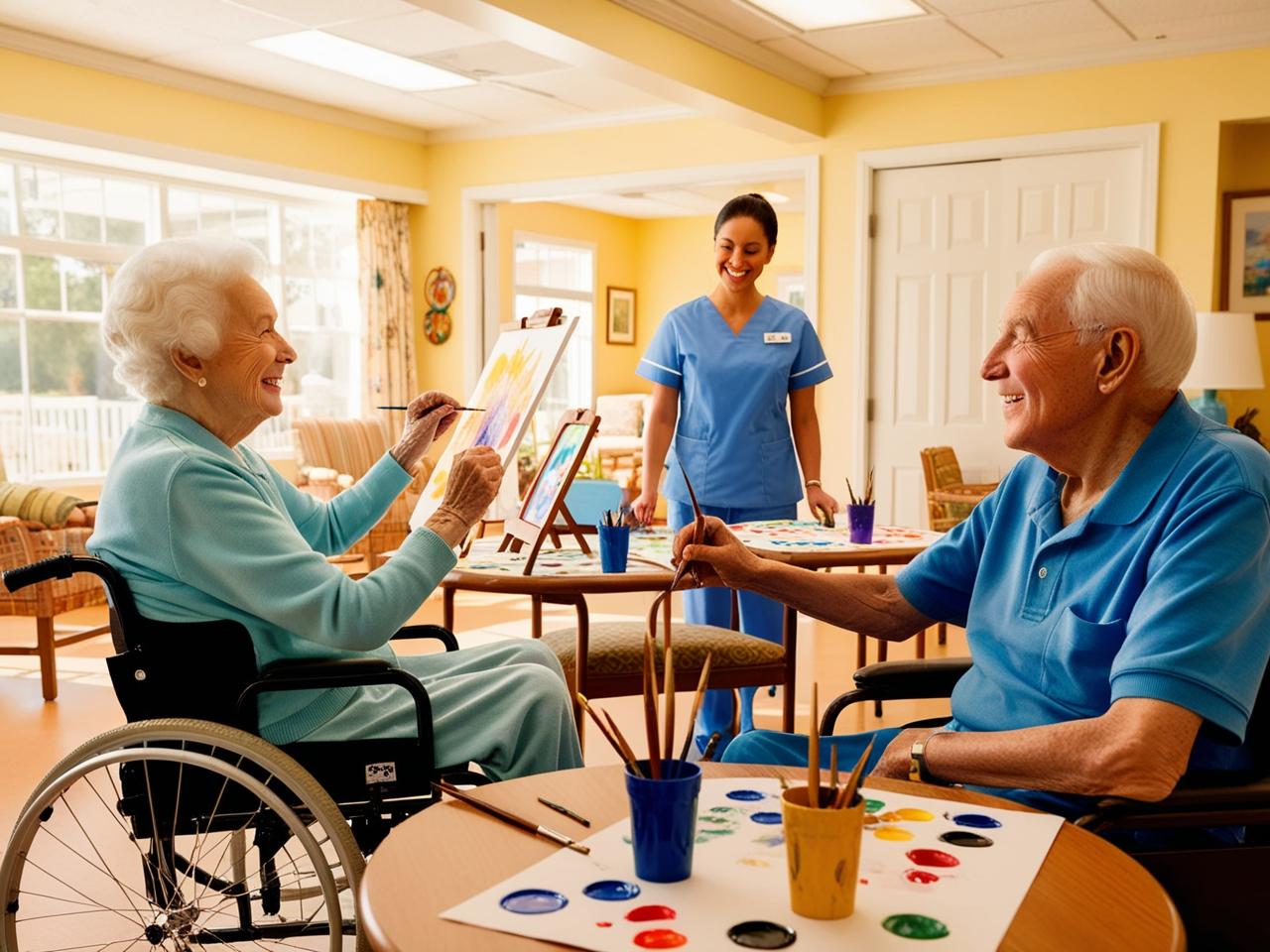Caring for a loved one with Alzheimer’s disease can be a deeply rewarding but also challenging experience. Alzheimer’s is a progressive brain disorder that affects memory, thinking, and behavior, making it increasingly difficult for individuals to perform daily tasks independently.
As a caregiver, it’s essential to have the right information, tools, and strategies to provide compassionate support to your loved one.
This comprehensive guide will offer practical tips and strategies for caring for someone with Alzheimer’s, focusing on providing compassionate care while also ensuring the caregiver’s well-being.
Understanding Alzheimer’s Disease
Alzheimer’s disease is one of the most prevalent forms of dementia, affecting millions of individuals worldwide. Here, we will delve into the intricacies of Alzheimer’s disease, exploring its overview, progression, common symptoms, and challenges faced by individuals living with this condition.
Overview of the Disease and its Progression
- Alzheimer’s disease is a progressive neurological disorder that typically manifests in older individuals.
- It is characterized by the accumulation of amyloid plaques and tau tangles in the brain, which lead to the degeneration and death of nerve cells.
- As the disease progresses, individuals may experience memory loss, cognitive decline, and changes in behavior and personality.
Common Symptoms and Challenges Faced by Individuals with Alzheimer’s
- Memory Loss: One of the hallmark symptoms of Alzheimer’s disease is the inability to retain new information and recall past memories.
- Cognitive Decline: Individuals with Alzheimer’s may struggle with reasoning, problem-solving, and decision-making as the disease affects cognitive function.
- Behavioral Changes: Alzheimer’s can lead to mood swings, agitation, confusion, and changes in personality, posing challenges for both the individual and their caregivers.
- Communication Difficulties: As the disease advances, individuals may have trouble finding the right words, following conversations, or expressing themselves effectively.
- Caregiver Strain: Family members and caregivers of individuals with Alzheimer’s often face emotional, physical, and financial challenges in providing care and support.
Empathy in Action – Providing Compassionate Care for Individuals with Alzheimer’s
Providing care for a loved one with Alzheimer’s disease can be a challenging and emotionally taxing responsibility. As a caregiver, it is essential to approach this role with compassion and understanding.
Communicating effectively with a loved one with Alzheimer’s
One of the most critical aspects of caring for someone with Alzheimer’s is effective communication. Individuals with Alzheimer’s may have difficulty with memory, comprehension, and verbal expression. Here are some tips for improving communication:
- Use simple language and short sentences.
- Maintain eye contact and speak slowly and clearly.
- Avoid arguing or correcting factual errors; instead, validate their feelings and provide reassurance.
- Be patient and allow extra time for responses.
Creating a safe and comfortable environment
Individuals with Alzheimer’s may become confused or disoriented easily, making it essential to create a safe and familiar environment for them. Here are some suggestions for enhancing safety and comfort:
- Remove tripping hazards and ensure adequate lighting.
- Label drawers and cabinets to aid in navigation.
- Maintain a consistent routine to provide a sense of predictability.
- Incorporate familiar objects or photographs to evoke positive memories.
Helping with daily tasks and routines
Basic daily activities can become challenging for individuals with Alzheimer’s, requiring assistance and guidance from caregivers. To provide effective help with daily tasks and routines:
- Break down tasks into simple steps and offer guidance as needed.
- Encourage independence and provide prompts rather than doing everything for them.
- Establish a daily routine for meals, medication, and personal care to maintain consistency.
- Maintain a calm and supportive demeanor during tasks to reduce agitation.
Emphasizing emotional support and understanding
Caring for a loved one with Alzheimer’s requires not only physical assistance but also emotional support and understanding. Here are ways to emphasize emotional support:
- Show empathy and compassion in your interactions.
- Listen actively and acknowledge their emotions and concerns.
- Engage in activities that bring joy and provide comfort.
- Seek respite care or support groups to prevent caregiver burnout and prioritize self-care.
Strategies for Managing Challenging Behaviors with a Loved One with Alzheimer’s
Living with a loved one who has Alzheimer’s disease can be both rewarding and challenging. One of the greatest challenges caregivers face is managing the various behavioral changes that can occur as the disease progresses. In this chapter, we will discuss effective strategies for managing challenging behaviors in individuals with Alzheimer’s disease to improve both their quality of life and that of their caregivers.
Dealing with Agitation and Aggression
- Understand the triggers: Identify the underlying causes of agitation or aggression, such as discomfort, fear, or frustration.
- Maintain a calm environment: Create a peaceful and structured environment to help reduce feelings of confusion and agitation.
- Use redirection techniques: Distract your loved one with a different activity or topic to redirect their attention away from the source of agitation.
Addressing Wandering and Confusion
- Ensure a safe environment: Secure doors and windows to prevent wandering and install alarms for added security.
- Establish a routine: Implement a consistent daily schedule to reduce feelings of disorientation and confusion.
- Provide reassurance: Offer comfort and support when your loved one feels lost or disoriented to help ease their anxiety.
Handling Sundowning and Sleep Disturbances
- Maintain a calming bedtime routine: Establish a soothing nighttime routine to help promote relaxation and improve sleep quality.
- Manage exposure to light: Limit exposure to bright lights in the evening to prevent disruptions to the body’s natural sleep-wake cycle.
- Consult a healthcare provider: Seek guidance from a healthcare professional to address underlying medical issues that may be contributing to sleep disturbances.
Coping with Changes in Personality and Mood
- Practice empathy and understanding: Approach your loved one with patience and compassion as they navigate the changes in their personality and mood.
- Encourage engagement in meaningful activities: Participate in activities that bring joy and a sense of accomplishment to help improve mood and overall well-being.
- Seek support: Connect with support groups or professional caregivers to receive guidance and emotional support when coping with challenging changes in your loved one’s personality.
Self-Care for Caregivers
Caring for a loved one with Alzheimer’s disease can be emotionally and physically demanding. As a caregiver, it’s crucial to prioritize self-care to ensure you can continue providing the best possible support to your loved one.
Importance of taking care of yourself:
- As a caregiver, your well-being directly impacts the quality of care you can provide to your loved one with Alzheimer’s.
- Prioritizing self-care helps you maintain your physical and mental health, reducing the risk of burnout and compassion fatigue.
- Taking time for yourself allows you to recharge, relax, and approach caregiving with renewed energy and patience.
Seeking support:
- Caregiving can be a challenging and isolating experience, which is why it’s essential to seek support from family, friends, or professionals.
- Share your feelings and experiences with trusted individuals who can offer emotional support and practical help.
- Consider joining a support group for caregivers, where you can connect with others facing similar challenges and exchange valuable advice and resources.
Recognizing signs of caregiver burnout:
- Caregiver burnout is a common phenomenon characterized by feelings of exhaustion, stress, and overwhelming responsibility.
- Signs of burnout may include irritability, difficulty sleeping, lack of energy, and loss of interest in activities you once enjoyed.
- To prevent burnout, it’s essential to set boundaries, ask for help when needed, and make time for activities that bring you joy and relaxation.
Strategies for prevention:
- Practice self-care activities such as exercise, meditation, or hobbies that promote relaxation and stress relief.
- Establish a routine that includes regular breaks, healthy meals, and adequate rest to maintain your physical and emotional well-being.
- Consider respite care options to give yourself a break from caregiving duties and prioritize your own needs.
Resources for Additional Support
As a caregiver for someone with Alzheimer’s, it is essential to know that you are not alone. Here, we will explore the various resources available to provide you with the support, information, and guidance you may need on this challenging journey.
Below are some key resources that can offer assistance to Alzheimer’s caregivers:
Local and Online Support Groups for Caregivers
- Local Support Groups: Many communities have support groups specifically for Alzheimer’s caregivers. These groups offer a safe space to share experiences, seek advice, and connect with others who understand the challenges you are facing.
- Online Support Groups: In addition to local support, online forums and social media groups can provide a valuable source of support. These virtual communities allow caregivers to connect with individuals from around the world, offering a diverse range of perspectives and insights.
Professional Organizations and Services for Alzheimer’s Caregivers
- Alzheimer’s Association: This organization offers a wide range of resources for both individuals with Alzheimer’s and their caregivers. From educational materials to training programs, the Alzheimer’s Association is a valuable source of support and information.
- Home Care Services: Professional home care services can provide caregivers with much-needed relief and assistance. These services offer personalized care plans tailored to the specific needs of the individual with Alzheimer’s, allowing caregivers to take a break while ensuring their loved one’s well-being.
Books, Websites, and Other Helpful Resources for Further Information and Guidance
- Recommended Books: There are numerous books available that provide guidance, tips, and personal stories from other caregivers. These resources can offer valuable insights and practical advice for navigating the challenges of caregiving.
- Informative Websites: The internet is a vast treasure trove of information on Alzheimer’s care. Websites such as the National Institute on Aging and the Family Caregiver Alliance offer articles, videos, and resources to help caregivers better understand the disease and how to best support their loved ones.
- Other Helpful Resources: From online courses to caregiver toolkits, there are a variety of resources available to assist Alzheimer’s caregivers. These resources can provide practical strategies, emotional support, and expert guidance to help caregivers navigate the complexities of caring for someone with Alzheimer’s.
Conclusion
Caring for a loved one with Alzheimer’s disease requires patience, compassion, and a deep understanding of the challenges that come with the condition. By following the tips and strategies outlined in this guide, caregivers can provide loving and effective support to their loved ones while also taking care of themselves. Remember, you are not alone in this journey, and reaching out for help is a sign of strength, not weakness. Together, we can navigate the complexities of Alzheimer’s with empathy and resilience.




Leave a Reply